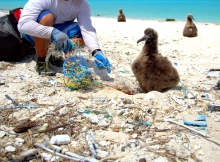
The NOAA Marine Debris Program is excited to welcome you to our new blog! Here you’ll find all the features you know and love, with improved integration into our website so all the information you need is right at your fingertips! If you’ve previously subscribed to our blog, don’t worry, you’ll continue to get email notifications of new blog posts. If you haven’t yet subscribed and would like to receive notifications, you can sign up by using the link on our new blog home page under “Email List Request.” All users can manage their account through the provided link.
We are excited to continue to share marine debris information, inspiring stories, and news to keep you informed about the world of marine debris. Every single one of us has a part to play in solving this preventable problem and being informed is the first step. Thank you for your efforts and your enthusiasm to help rid our ocean and Great Lakes of marine debris. We are excited to introduce you to our new blogging platform. Welcome.